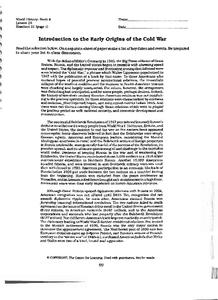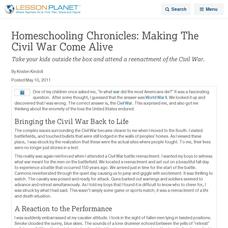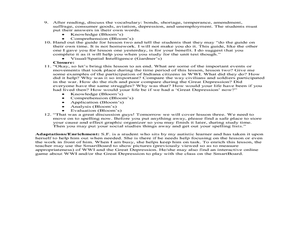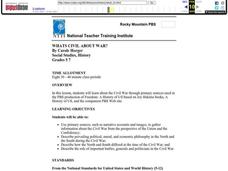Curated OER
American Reactions to Fascist Aggression
Students consider the causes of World War II. In this origins of World War II lesson, students discuss American reactions to fascist aggression prior to the war.
Miami-Dade County Public Schools
Veteran's Day—Honoring All That Served
Looking for ideas on ways to recognize Veteran's Day? Check out this 92-page packet that includes exercises designed for all grade levels. Reading passages detail the history of the holiday, research projects get individuals involved in...
Curated OER
History-Causes of WW I
Seventh graders participate in a class discussion about what caused World War II. Working in groups, they identify the reasons they believe were most important in starting the war and present their reason in the form of a PowerPoint,...
Curated OER
Selling Warfare - Propaganda Posters
Students examine the use and purpose of propaganda posters during World War I. They work in groups to create a propaganda poster supporting a nation's war effort.
Curated OER
Events of World War II
Ninth graders examine the main leaders and events of World War II. In small groups they analyze images of main events in WWII, listen to a lecture, and complete a fill-in-the-blank worksheet.
Curated OER
End of WWI: The Treaty of Versailles
After learning about the causes and closure of WWI, hand out this resource on that outlines the differences between Wilson's 14 Point Plan and the Treaty of Versailles. The class reads the information provided then analyzes two political...
Curated OER
U.S. Entry Into WWI
Students identify the reasons why the United States entered World War I. In this world history lesson, students are given a lecture on Woodrow Wilson and analyze documents (specifically, Woodrow Wilson's speeches). Students answer...
Curated OER
Introduction to the Early Origins of the Cold War
In this Cold War activity, students read an article titled "Introduction to the Early Origins of the Cold War," and then make a list of key dates and events from the selection.
Curated OER
The Treaty of Versailles: June 1919
There were four key players involved with the Treaty of Versailles. Present information and critical thinking questions regarding Woodrow Wilson, David Lloyd-George, Georges Clemenceau, and Vittorio Orlando. Included also are lists of...
Core Knowledge Foundation
Volume 2 - A History of the United States: Modern Times—Late 1800s to the 2000s
The second volume of the Core Knowledge History of the United States ebook begins by asking young scholars to consider the impact immigration, industrialization, and urbanization had on the United States in the late 1800s. The text ends...
Curated OER
Homeschooling Chronicles: Making The Civil War Come Alive
The Civil War is a complex topic that students can study in a variety of ways, including watching a reenactment.
Curated OER
Literature and the "Age of Anxiety" (1920s and 1930s).
High schoolers examine historical events of the 1920s, World War II and the Cold War. They discover how literature reflects the economic, political, social, religious and historical concerns of a culture. Students compare literature...
Smithsonian Institution
Spanish American War
Today, Cuba and America sometimes struggle with diplomatic relations, but did you know that America went to war against Spain to free Cuba? Learners examine many interesting facts related to the Spanish American War using an informative...
Curated OER
WWII Website
Tenth graders research a topic related to World War II. They explore the causes and legacy of WWII, the European Theater of Operations, the Pacific Theater of Operations, Diversity in WWII, Women in WWII, and the Homefront. Students...
Curated OER
Mapping and Personifying Nations
Eleventh graders analyze the geography, actions, and relationships of countries involved in World War II. They create a map of Europe, Northern Africa, and the Pacific, and analyze and evaluate their self-made map of Europe and the...
Curated OER
America's Wars
Pupils classify information regarding American involvement in wars. In this classification lesson, students examine the causes of the war in which the United States has been involved, and classify them as mainly political, social,...
Curated OER
WWI & Depression
Fourth graders describe WWI influence in Indiana. In this guided reading instructional activity students read about the participation of Indiana citizens during World War I. Students give examples of event that changed life in Indiana...
Curated OER
The Conscription Crises
Students explore roles played by Canada's prime ministers The Right Honorable Sir Wilfrid Laurier and The Right Honorable iam Lyon Mackenzie King with regards to the conscription crises of World War I and World War II.
Curated OER
What Was South Carolina's Role in the Spanish American War?
Seventh graders investigate the role of South Carolina in the Spanish American War. In this imperialism lesson plan, 7th graders analyze primary documents and photographs, in collaborative groups, to determine how the state was involved...
Curated OER
What's Civil About War?
Students study about the Civil War through primary sources used in the PBS production of "Freedom: A History of US" based on Joy Hakim's books, "A History of US", and the companion PBS Web site.
Curated OER
Guerilla Warfare During The Boer War
Tenth graders define guerilla warfare in relation to the Boer War. Students explain the relationship between the British and the Boers through the analysis of a primary source document, which is included in the instructional activity.
Curated OER
Pacifism vs. Patriotism in the 1920s
Students examine the philosophy of different organizations after World War I. They discover the impact of the "Red Scare" and how this affected peace organizations of the time.
Curated OER
Espionage and Sedition Acts: Mock Trial
Bring to life the severity of the Espionage and Sedition Acts through a mock trial. Learners have prior knowledge of WWI and the context of these acts. An anticipatory set gets the class discussing the ethics of wartime dissension, and...
Curated OER
Armenian Genocide
As your historians examine the beginnings of WWI, ensure they are familiar with the Armenian Genocide. This basic introductory lesson plan utilizes teacher-led discussion, map analysis, and a Socratic seminar. Not much detail is offered...

























